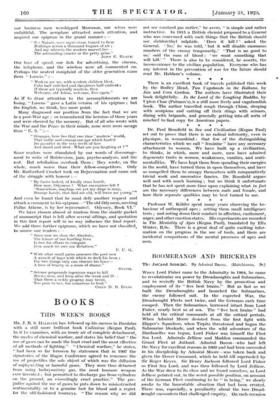BOOKS
THIS WEEK'S BOOKS
Mn. J. B. S. HALDANE has followed up his success in Daedalus with a still more brilliant book Callinieus (Kegan Paul). In it he examines, with an ironic air of complete detachment, the modes of chemical warfare, and states his belief that " the use of gases can be made the least cruel and the most effective of all methods of fighting." " Chemical warfare," he states, " had been so far foreseen by statesmen that in 1907 the signatories of the Hague Conference agreed to renounce the use of projectiles the sole object of which was the diffusion of asphyxiating or harmful gases. They were thus debarred from using lachrymatory gas, the most humane weapon ever invented ; but permitted to discharge gas from cylinders on the ground, an exceedingly cruel practice." The pre- judice against the use of gases he puts down to misinstructed sentimentality or to a genuine lust for blood and a regret for the old-fashioned tourneys. " The reason why we did not use mustard gas earlier," he avers, " is simple and rather: instructive. In 1915 a British chemist proposed to-a General who was concerned with such things that the British should. use diehlorcthyl sulphide. ' Does it kill ? ' asked the General. ` No,' he was told, ' but it will- disable enormous numbers of the enemy temporarily." That is no good to us,' said the man of blood ; ' we want something that will kill.' " There is also to. be considered, he asserts, the inconvenience to the civilian population. Everyone who has any interest in the prevention of war for the future should read Mr. Haldane's volume.
* * *














































 Previous page
Previous page